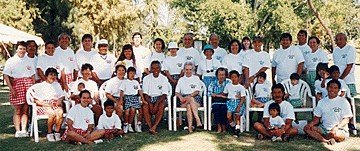
The Wong family reunion.

The Wong family reunion.
"We've always had a very close family," said Leong-Chun, 32, of Honolulu. "When my grandfather passed away, the one thing he wanted us to do was stay close and spend time together."
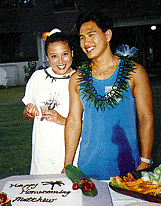 Ruthie and Matthew Wong.
Ruthie and Matthew Wong.
Since 1987 as many as 40 of her mother's family, the Wongs, gather annually at a different location each year - from the Colorado Rockies to the Mauna Kea Hotel to Waimea Plantation Cottages - to enjoy each other and celebrate their history. An uncle pays all expenses.
"It's our chance to reconnect, to remember we're a family, not feel isolated or alone, to remind one another we are there for one another..." Leong-Chun said.
Family reunions for Haleiwa's Ken and Marilyn Walsh started a decade ago after the death in an automobile accident of a Florida niece.
"It made us think how important it was to stay connected with family because being isolated in Hawaii we'd started to drift apart," said Marilyn, a North Shore Realtor. "All the family kids were about the same age but still didn't know each other very well."
In today's get-up-and-go society, the splintering of the family has not gone unnoticed.
"I think what is happening is that the family has gone from something people took for granted or found burdensome to something that is like sand slipping though your fingers," said Ira Wolfman, author of "The Kids' Book of Genealogy: A Guide For Ancestor Detectors." "If you don't hold on to what you've got, you suddenly discover that it's gone."
Then Marshall Walsh, Ken's father who also lives in Florida, initiated a reunion, saying he would pay all expenses for annual gatherings in Hawaii and Florida.
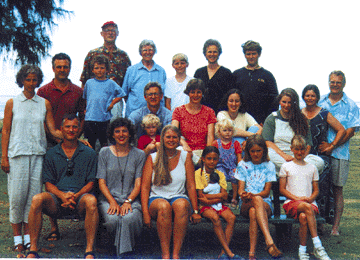
The Schneider family reunion.
The United States is a nation of wanderers, built in part by people who set out to seek opportunity and fortune far from home. (About 44 million, or 18 percent, of the U.S. population move each year, according to the Census Bureau. Compare that to Ireland where only about 5 percent of the population moves.)
People, and families, start to feel isolated, and it's precisely this isolation that seems to compel many far-flung relatives to interrupt busy routines for a few days each year and make a pilgrimage to an old family homestead, a camp meeting ground, a posh resort or familiar church or hall.
Family reunions are "a kind of symbol of security and a lost past that families can make happen one day, one week, or longer each year," said Cheryl Salazar, manager of Waimea Plantation Cottages, which annually hosts dozens of family reunions.
(The Kona Village Resort on the Big Island has also begun a family reunion program. Since May, the resort has hosted 67 family reunions, including 16 in June and 32 in August. The Mauna Lani Bay Hotel & Bungalows also accommodates several reunions each year.)
A family reunion is something "to cherish, from the party's initial planning stages right through to when the last guests pick up their award," Leong-Chun said.
The Wong reunion was created to celebrate adopted cousin Matthew's arrival 25 years ago on Aug. 10. Matthew was six months old when he was adopted; his sister, Ruthie, was adopted at birth.
In the summer of 1994, Wong family members - ages 6 months to the 108-year-old grandmother - traveled from Phoenix, California and Oahu to spend five days at Waimea.
They celebrated with several activities: contests, an award ceremony, day excursions, a banquet and local entertainment. Leong-Chun hired a professional announcer to emcee competitions that included racing tiny cars built from PVC pipe, launching water ballons into big tubs and a croquet tournament where everyone wore white-on-white.
"The heart and soul of our reunion is fun and interaction, the chance to sit and talk, renew old bonds, make new ones," Leong-Chun said.
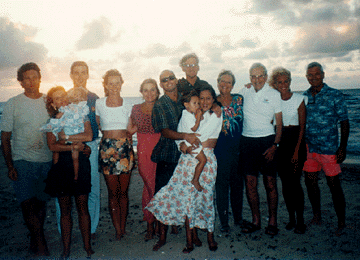
The Walsh family reunion.
Later they may sing along while "Granddad Marshall" plays the piano. Then there's the "official reunion night."
"One year we had T-shirts made up that said 'I'm Related To Marshall.' His shirt said 'I'm Marshall,' then we all went out to dinner."
Last year, the reunion was held in Hawaii in conjunction with Ken and Marilyn Walsh's daughter's wedding. Family members stayed in rented neighborhood homes.
"We had a blast," Marilyn said, "before the wedding, during the wedding and afterwards."
This sort of familial mayhem is the glue not only for the Walshes and Leong-Chuns but for thousands of other family reunions that uphold a ritual amid perpetual change, continuity when nothing is certain. Grandparents, sometimes even a parent, may be far away, and cousins, aunts, uncles and nephews and nieces start to seem like strangers, Marilyn said.
"It's easier for people to feel a sense of dis-belonging, or disconnectedness" making it more even important for kids to latch onto something inviolable," she said.
But family reunions organizers emphasize involve hard work, and facing a sometimes trying reality: You can't pick your relatives.
"Fortunately," Leong-Chun said laughing, "we all get along very well."
Marilyn said her family have "tapped into" relatives in a way that had seemed impossible because of the miles between their respective homes.
"When we first started doing reunions we didn't know what to expect. There was concern about spending 10 days with people you hardly knew. But it's evolved to where everyone even the kids are anxious for the next reunion."
Reunions, says Waimea's Salazar, is "a chance for relatives to touch base with the past and become acquainted with the future."
Margaret Schneider of Berkeley, Calif., and 22 members of her family - half children - stayed for several days at Waimea cottages last June. Picking "neutral fun turf" like Hawaii is key, she said, because it allows people to talk more than if they were in their own home "with their stuff to distract them."
"What I really love is that my kids get to be with their cousins and nephews and nieces; it makes for a stronger bond," said Schneider, 44. "It gives them feel important."
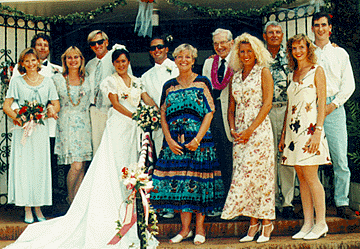
The Walshes planned their reunion to coincide with a family wedding being held here.
"At Waimea we cooked for ourselves which was a first for our family reunion," Schneider said. "It felt so relaxed and boy, did we talk."
The Schneider gathering doesn't include many organized activities.
"One year, there were two newborns so we just sort of hung out and watched the babies," she said. "It was a time just to be together and enjoy ourselves; that's a great agenda."
Ann Jeffries and Brian O'Neil, of Atherton, Calif., have been visiting Waimea Plantation Cottages every Christmas for the last eight years but this holiday season they're coming with 27 relatives, ages 9 months to the mid 80s. Five people are coming from Switzerland.
"Everyone is spread around so far away it's a little scary," Jeffries said. "I feel a bit fragmented. Some relatives have never met."
Jeffries' sister organized the first reunion two years ago after her parents died and the family felt the need to reconnect.
"We've talked about cooking our own meals and maybe posting a day-trip schedule so we can go hiking or to the beach together. But the important thing is we'll be together with family in one place."